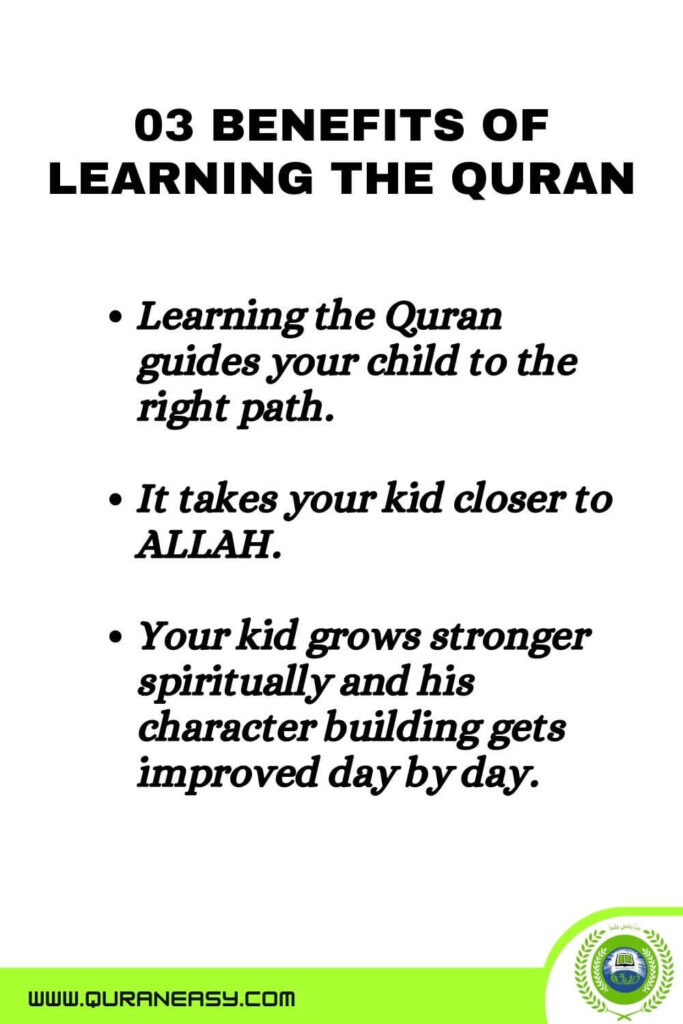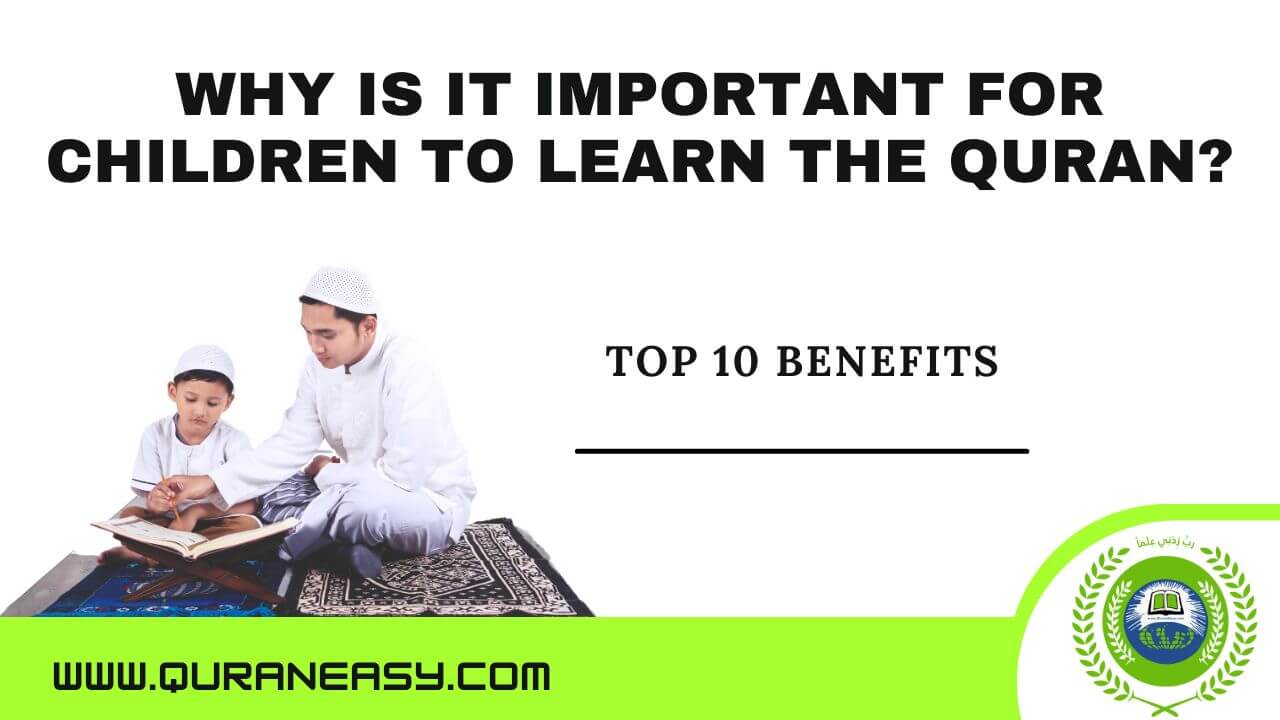The Quran, the holy book of Muslims, is more than just a compilation of verses. It’s a guide to life, offering valuable lessons and teachings. For children, especially, the Quran can serve as a foundation for growth in various aspects of life, from spiritual development to character building.
With its rich narratives and teachings, the Quran helps shape the minds and hearts of the young, guiding them towards a path of righteousness, understanding, and compassion.
In this article, I will share why is it important for children to learn the Quran and 10 profound benefits that children can derive from learning the holy book, shedding light on how it can positively influence their lives in multifaceted ways. Whether you’re a parent, teacher, or simply curious, join us in exploring the many ways the Quran enriches the lives of the young.
Why Is It Important For Children To Learn The Quran? Top 10 Reasons
The Quran isn’t just a book; it’s a life guide for many. Get your child admission in our learn Quran online classes and give them a roadmap for life’s journey, filled with wisdom and lessons. Here are the top 10 reasons why it’s essential for children to learn the Quran.
Finding the Way (Guidance)
The Quran, with its profound teachings, serves as a valuable source of guidance for children. It provides insights on how to lead a righteous and meaningful life.
The following verse highlights the Quran’s role in guiding towards truth and goodness.
“And this is a Book which We have sent down, blessed and confirming what was before it…” (Quran 6:92)
By following the teachings and principles outlined in the Quran, children learn to navigate through life’s challenges with wisdom and resilience.
It’s like having a roadmap that helps them find the right path, making good choices, and developing a deeper understanding of life and its purpose.
Feeling Close to God (Spiritual Development)
Spiritual development is a significant aspect of a child’s growth, nurturing a sense of purpose and connection to a higher power.
The Hadith below emphasizes the importance and virtue of engaging with the Quran.
“The best among you are those who learn the Quran and teach it” (Bukhari)
Through learning and understanding the Quranic verses, children develop a deeper connection to their faith, cultivating a sense of spiritual awareness and reverence.
This spiritual bond enhances their emotional well-being, providing a source of comfort, hope, and strength, especially in challenging times. It’s a nurturing process that enhances their sense of identity and belonging within their faith community.

Learning Patience and Focus
Patience and focus are vital skills for personal and academic success. The practice of regular prayer and recitation as taught in the Quran helps in cultivating these skills.
“So be patient. Indeed, the promise of Allah is truth.” (Quran 30:60)
The above verse tells the importance of patience in life. Through the disciplined practice of recitation and reflection on such Quran verses, children learn the value of patience, perseverance, and focus.
These skills not only aid in their academic endeavors but also in handling the ups and downs of life with grace and determination. They learn to stay focused on their goals and be patient in their efforts, which are invaluable life skills.
Feeling Of Belonging
Being part of a community that shares common beliefs and values creates a sense of belonging and security.
“إِنَّمَا الْمُؤْمِنُونَ إِخْوَةٌ فَأَصْلِحُوا بَيْنَ أَخَوَيْكُمْ ۚ وَاتَّقُوا اللَّهَ لَعَلَّكُمْ تُرْحَمُونَ”
(سورة الحجرات – الآية 10)
“The believers are but brothers, so make peace between your brothers and fear Allah that you may receive mercy.” (Surah Al Hujurat, verse 10)
The teachings of the Quran reinforce the importance of community, encouraging children to be active and responsible members. This sense of belonging gives a supportive environment where children can grow, learn, and thrive both spiritually and socially.
It’s a comforting feeling that nurtures their self-esteem and social identity, providing a solid foundation for their overall social development.
Learning Right from Wrong (Moral Values)

Virtues and benefits of learning Quran
The Quran’s teachings provide a clear distinction between right and wrong, enabling a child to develop a strong moral compass from a young age. The verses from the Quran serve as a guide, reminding children of the importance of honesty, compassion, and fairness.
Allah says in Quran:
Indeed, this Qur’an guides to that which is most suitable and gives good tidings to the believers who do righteous deeds that they will have a great reward.
Surat Al-‘Isrā’ (The Night Journey) – سورة الإسراء
The verse from Quran 17:9 serves as a reminder that the Quran is a source of guidance towards good behavior. By understanding and reflecting on such verses, children learn to make ethical choices, promoting a sense of responsibility towards themselves and others.
Over time, these lessons become deeply embedded, forming the basis of a child’s moral and ethical outlook on life, which is important for their interaction with the world around them.
Growing as a Person (Character Building)
The character-building teachings of the Quran encompass a broad spectrum of virtues such as respect, humility, and kindness. By delving into the stories and teachings of the Quran, children get to explore exemplary characters and their righteous deeds.
This exposure helps in shaping their character, imbuing them with qualities of empathy, respect, and understanding.
As they grow and interact with others, these character traits play a crucial role in forming healthy relationships and a positive social standing. The nurturing environment of Quranic learning provides a fertile ground for the holistic personal growth of a child.
Understanding Different Cultures
The Quran provides a window into different cultures and histories, fostering a sense of appreciation and respect for diversity. Through the stories and teachings of the Quran, children learn about various prophets, communities, and historical events, enriching their cultural understanding.
“يَا أَيُّهَا النَّاسُ إِنَّا خَلَقْنَاكُم مِّن ذَكَرٍ وَأُنثَىٰ وَجَعَلْنَاكُمْ شُعُوبًا وَقَبَائِلَ لِتَعَارَفُوا ۚ إِنَّ أَكْرَمَكُمْ عِندَ اللَّهِ أَتْقَاكُمْ ۚ إِنَّ اللَّهَ عَلِيمٌ خَبِيرٌ”
(سورة الحجرات – الآية 13)
“O mankind, indeed We have created you from male and female and made you peoples and tribes that you may know one another. Indeed, the most noble of you in the sight of Allah is the most righteous of you. Indeed, Allah is Knowing and Acquainted.”
This cultural exposure widens their horizons, promoting tolerance, understanding, and respect for different cultures and beliefs. It’s a step towards nurturing well-rounded individuals who value diversity and contribute positively to a multicultural society.
Making Friends
The communal nature of Quranic learning provides ample opportunities for socialization. Children interact with their peers, forming friendships and learning important social skills such as communication, cooperation, and conflict resolution.
“صَلَاةُ الْجَمَاعَةِ تَفْضُلُ صَلَاةَ الْفَذِّ وَالْعَشَاءِ بِسَبْعٍ وَعِشْرِينَ دَرَجَةً”
(صحيح البخاري)
“The prayer offered in congregation is twenty-seven times superior to the prayer offered alone in terms of rewards.” (Sahih Al Bukhari)
The bonds formed during this learning journey often last a lifetime, providing a supportive network of friends who share common values and beliefs. This social interaction enriches their life experience, aiding in their emotional and social development.
Better Language and Thinking Skills
The linguistic richness of the Quran provides an excellent opportunity for enhancing language and cognitive skills. The process of learning Arabic, understanding the meanings, and reflecting on the teachings sharpens their linguistic and analytical abilities.
“تَعَلَّمُوا الْعَرَبِيَّةَ فَإِنَّهَا تُزِيدُ فِي الْعَقْلِ وَتُوَسِّعُ فِي الْقُرْآنِ” (مسند أحمد)
“Learn the Arabic language, as it will increase your intelligence and facilitate your understanding of the Quran.” (Musnad Ahmad)
It’s a mentally stimulating experience that fosters a love for learning, curiosity, and a deeper understanding of complex concepts. This important and cognitive enrichment not only benefits them in their academic pursuits but also nurtures a lifelong love for learning and exploration.
Respecting Elders and Leaders
Respect for authority is a significant lesson imparted through Quranic teachings. Children learn to honor their elders, teachers, and community leaders, understanding the importance of guidance and mentorship.
“وَقَضَىٰ رَبُّكَ أَلَّا تَعْبُدُوا إِلَّا إِيَّاهُ وَبِالْوَالِدَيْنِ إِحْسَانًا ۚ إِمَّا يَبْلُغَنَّ عِندَكَ الْكِبَرَ أَحَدُهُمَا أَوْ كِلَاهُمَا فَلَا تَقُل لَّهُمَا أُفٍّ وَلَا تَنْهَرْهُمَا وَقُل لَّهُمَا قَوْلًا كَرِيمًا” (سورة الإسراء – الآية 23)
“And your Lord has decreed that you not worship except Him, and to parents, good treatment. Whether one or both of them reach old age [while] with you, say not to them [so much as], ‘uff,’ and do not repel them but speak to them a noble word.” (Surah Al-Israa, verse 23)
This respect for authority shapes their behavior, teaching them the importance of obedience, cooperation, and the value of experience and wisdom. It’s a lesson that holds them in good stead, fostering respectful interactions and a harmonious community life.
Final Thoughts
The Quran is more than just a religious text for children; it’s a comprehensive guide that molds their spiritual, moral, and social dimensions. By embracing its teachings, children are equipped with tools that serve them in every facet of life, helping them grow into well-rounded individuals.
This early foundation not only strengthens their faith but also equips them to face the complexities of life with clarity, compassion, and resilience. Encouraging children to learn the Quran is, undoubtedly, one of the greatest gifts we can offer for their lifelong journey.





Leave A Comment